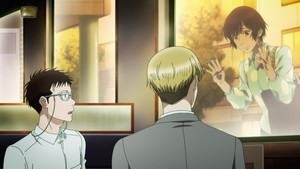The Night Beyond the Tricornered Window
Episodes 1-3
by Rebecca Silverman,
How would you rate episode 1 of
The Night Beyond the Tricornered Window ?
Community score: 3.4
How would you rate episode 2 of
The Night Beyond the Tricornered Window ?
Community score: 4.1
How would you rate episode 3 of
The Night Beyond the Tricornered Window ?
Community score: 4.2

If there's any one question likely to be running through your head at this point in The Night Beyond the Tricornered Window, it's probably, “What is the deal with Hiyakawa?” Given that that's going to be something of a central theme later on in the series (per the manga), it's a very good question, and Hiyakawa's actions and behaviors certainly invite us to question him. The downside to this is that we're presented with a relationship that feels very much like an abusive one, and I do feel like that comes out a bit stronger here than in the source material; Hiyakawa is possessive, disrespectful of Mikado's personal space and boundaries, and comes dangerously close to forbidding him to interact with other psychics. That he doesn't appear to feel threatened by nonpsychics is an interesting distinction.
What's striking, though, is that Hiyakawa dislikes Hiura and Maeno for doing the exact same things that he does to Mikado. In episode one, Hiyakawa forces his way into both Mikado's life and his body (in the psychic sense), essentially making an offer that Mikado isn't permitted to refuse, although I'm honestly not sure that Hiyakawa ever thought that he would. There's something distinctly selfish and self-serving about Hiyakawa's behaviors, most notably that he appears to think that if it can happen and he wants it to happen, it simply should. While I promise that there is a reason for this, right now it's like a grown-up version of childhood caprice, as if Hiyakawa is an adult in body only while his mind remains that of an indulged child. This is perhaps best seen when he puts what Maeno terms a “rope” on Mikado, a psychic bond that keeps the hands of others off of the person whom, as Hiyakawa puts it, he found first. It's like writing your name on your favorite chair in a classroom, when the chair ultimately doesn't have an owner.
This contrasts interestingly with Hiura's behaviors. We don't know much about her yet apart from the fact that she's a creepy necromancer, but there's plenty of cause for alarm. The woman we see her curse at the end of episode one ends up dead not long after, and the second time we see her, she's been cursing a girl at school before barging into Mikado's consciousness to remove him and Hiyakawa from the classroom. She calls herself a “curse purveyor” and insists that the girl at school deserved it, but that doesn't necessarily make anything she's done right (or even “right”) – and it's alarmingly similar to the proprietary way that Hiyakawa treats Mikado. Somewhat ironically, Hiura can see that how Hiyakawa handles Mikado is wrong, so either she's remarkably unaware of her own predatory behavior or she's not really acting of her own free will, something that may be implied by the mysterious man at the window at the end of episode three.
If we're to see a link between Hiura and Hiyakawa, that means that we have to think a bit more about why he may be behaving as he does. If there's someone pulling Hiura's strings, could there not also be someone guiding Hiyakawa – or someone who did during his more formative years? When Mikado asks him about his parents and friends, Hiyakawa simply says that he has none, not sounding all that broken up about it, and that could be part of the key to understanding him. Yes, right now it's looking more like he possibly killed and ate them at some point in the past, but that's almost too pat an answer. Hiyakawa is playacting his way through normal, the opposite of what Hiura does when she finds the men at Yummy's (my current favorite anime restaurant name), which again may serve as a link between them.
About all that's certain is that Mikado is out of his depth. What his long-missing father (who suspiciously destroyed all photos of himself) has to do with this is up in the air, but the increasingly creepy imagery – episode two's CG toilet monstrosity aside – and Hiyakawa's inability to stay out of Mikado's personal hula hoop are definitely driving up the insidious factor. It's not always easy to watch, but there's something fascinating about what we're not being told.
Rating:
The Night Beyond the Tricornered Window is currently streaming on Crunchyroll.
The views and opinions expressed in this article are solely those of the author(s) and do not necessarily represent the views of Anime News Network, its employees, owners, or sponsors.
discuss this in the forum (37 posts) |
back to The Night Beyond the Tricornered Window
Episode Review homepage / archives